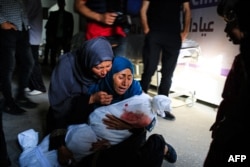
DEIR AL-BALAH, Gaza Strip – The armed wing of Hamas on Sunday, for the first time in months, launched a “large rocket barrage” targeting Israel’s commercial hub of Tel Aviv, a show of resilience from the Palestinian militants in the eighth month of the Israel-Hamas war.
Air raid sirens blared during the attack, but Israel said there were no immediate reports of casualties or damage. It was the first long-range rocket attack from Gaza since January, although rockets and mortar rounds have been fired at Israel from along the Gaza border since then. In the latest attack, rocket launches could be heard from central Gaza.
Hamas’s Izzedine al-Qassam Brigades said in a post on Telegram that it had targeted Tel Aviv ‘with a large rocket barrage in response to the Zionist massacres against civilians.”
The Israeli military said eight projectiles crossed into Israel after being launched from near the southern Gaza city of Rafah, where Israeli forces recently launched an incursion. Israel said ‘a number’ of the projectiles were intercepted.
Earlier, humanitarian aid trucks had crossed into Gaza from southern Israel through a new agreement to bypass the Rafah crossing with Egypt after Israeli forces seized the Palestinian side of it earlier this month. But it was not clear if humanitarian groups would be able to access the aid because of ongoing fighting in the region.
Egypt has refused to reopen its side of the Rafah crossing until control of the Gaza side is handed back to the Palestinians. It agreed to temporarily divert traffic through Israel’s Kerem Shalom crossing, Gaza’s main cargo terminal, after a call between U.S. President Joe Biden and Egyptian President Abdel Fattah el-Sissi.
Egyptian trucks carrying humanitarian aid bound for the Gaza Strip wait near the Rafah border crossing on the Egyptian side, May 26, 2024
That crossing has been largely inaccessible because of fighting linked to Israel’s offensive in the nearby city of Rafah. Israel says it has allowed hundreds of trucks to enter, but United Nations agencies say it is usually too dangerous to retrieve the aid on the other side.
The International Court of Justice on Friday ordered Israel to comply with its “obligations” under the Genocide Convention and “immediately halt its offensive” in Rafah, but there does not appear to be any change in Israel’s war effort in southern Gaza.
The United States, Israel’s main arms supplier, has repeatedly advised Israel against a full-scale ground attack on Rafah but says it considers current fighting there to be a “limited” incursion that is avoiding extensive civilian casualties. Washington has not commented on the ICJ demand for an end to the fighting in Rafah.
 A Palestinian woman holds the shrouded body of a child killed in Israeli bombardment, at a health clinic in the area of Tel al-Sultan in Rafah in the southern Gaza Strip, May 26, 2024
A Palestinian woman holds the shrouded body of a child killed in Israeli bombardment, at a health clinic in the area of Tel al-Sultan in Rafah in the southern Gaza Strip, May 26, 2024
The court is a branch of the United Nations and has no mechanism to enforce its orders. They must be voted on by the U.N. Security Council, where the U.S. has veto power.
Israeli Prime Minister Benjamin Netanyahu has vowed Israel will not leave Gaza until any remaining Hamas control of the territory is ended. He says Israel must take over Rafah to eliminate Hamas’s last four battalions there and achieve its goal of ‘total victory’ over the militants, who have recently regrouped in other parts of Gaza where the Israeli military had previously taken control.
The Israel-Hamas war was triggered by the October 7 Hamas terror attack on Israel that killed 1,200 people and led to the capture of about 250 hostages. Israel’s subsequent counteroffensive has killed nearly 36,000 Palestinians, a death toll that includes both civilians and combatants, according to Gaza’s Hamas-run health ministry.
Netanyahu faces growing international pressure – and from the Israeli public – to make a deal with Hamas to free 100 or so remaining hostages, which Hamas has refused to do without guarantees for an end to the war and the full withdrawal of Israeli troops. Netanyahu and other Israeli leaders have ruled that out.
Some material in this report came from The Associated Press and Agence France-Presse.


